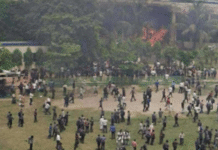
A federal judge on Tuesday said the administration of US President Donald Trump cannot quickly fire thousands of probationary federal workers in 19 states and Washington, DC, narrowing an earlier nationwide ruling.
US District Judge James Bredar in Baltimore, Maryland, said that if federal agencies want to fire large numbers of probationary workers, they must follow the required procedures for conducting mass layoffs of government employees.
The administration failed to do so when it terminated about 24,500 people in February without notifying states and local governments in advance, he said. But Bredar said he only had the power to require the reinstatement of employees who either live or work in the mostly Democratic-led states that, along with Washington, DC, sued over the mass firings.
Representatives for the White House did not immediately respond to an email seeking comment.
Maryland Attorney General Anthony Brown, whose office led the lawsuit, said the Trump administration’s claim that the workers were fired for poor performance was false.
“This was a coordinated effort to eliminate the federal workforce “ even if it meant breaking the law,” Brown said in a statement.
Probationary employees typically have less than a year of service in their current roles, though some are longtime federal employees.
Bredar on 13 March had already ruled that the firings were likely illegal and ordered 18 agencies to reinstate workers who had been fired pending further litigation. Tuesday’s decision will be in place pending the outcome of the lawsuit, which could take months or longer to resolve.
A large number of federal employees live in Washington and neighboring Maryland, while some of the most populous US states, including California, New York, and Illinois, are plaintiffs in the case.
The Trump administration has appealed Bredar’s earlier decision, claiming the firings were lawful and the judge lacked the power to require workers to be reinstated. A US appeals court panel earlier in March declined to pause his ruling, but a Trump-appointed judge criticised the nationwide scope of the order.









